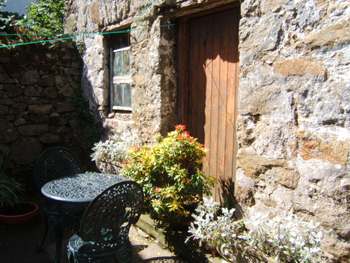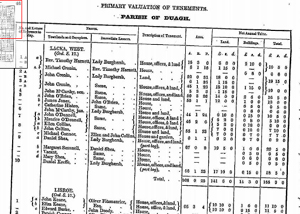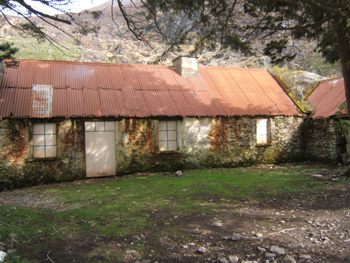 Discovering the age of your cottage is much like trying to uncover your family tree, the further you go back the more difficult it becomes. As a general rule, cottages are an architectural style all of their own, transcending the years and fashions. The style is rarely indicative of its age, a larger style cottage may be deceptive as it could have started out as a two bedroomed cottage and have been extend over the years as the inhabitants became more affluent to become a thatched mansion. Conversely, that run down turf shed or ruin on your land could be a cottage hundreds of years old who’s owners fell on hard times.
Discovering the age of your cottage is much like trying to uncover your family tree, the further you go back the more difficult it becomes. As a general rule, cottages are an architectural style all of their own, transcending the years and fashions. The style is rarely indicative of its age, a larger style cottage may be deceptive as it could have started out as a two bedroomed cottage and have been extend over the years as the inhabitants became more affluent to become a thatched mansion. Conversely, that run down turf shed or ruin on your land could be a cottage hundreds of years old who’s owners fell on hard times.
The following are some of the best ways of tracing the age of your property:
1. Word of mouth
We are a nation of storytellers, that’s for sure. Many of these stories are pure fiction but they also contain the threads of our history and heritage. Villages and townlands tended to be very small places and a lot of neighbors were quite closely related, it is very possible that a neighbor of your cottage could know a good deal about the property through tales handed down.
2. Census
Ireland has an unfortunate history when it comes civil records. Our earliest records were decimated through a series of petty thefts, damp damage and fires in the surveyor generals office and in the Bermingham Tower of Dublin castle prior to the 1800’s. Around that time, the British decided to conduct census of Ireland however the censuses from 1821, 1831, 1841 and 1851 were mostly destroyed by fire as a result of the Uprising although some records remain. The records from 1861 through 1891 were destroyed by order of the government prior to 1922. As a result of all this – the earliest census returns available are from 1901 and are available on microfilm in the National Archives of Ireland.
3. Parish Priests
Another possible source of records is the local parish priest. If you have found a name of a previous inhabitant it maybe possible to trace back their family. If they stayed in the townland it is most likely they were in the same cottage through the generations. It is quite possible that parish priests may have some of the oldest records possible as civil registration of all events did not begin until 1864.
4. Local Records
Local courts will have records of any legal events involving the property – when it changed hands, disputes, purchases etc… The District court deals with local criminal, civil, family law and licencing and should be able to provide you with information about any issues that arose relating to your property. The next step up is the Circuit Court which handles more serious cases in the area of civil, criminal, family law and jury duty. For more information on the courts services see The Courts Service of Ireland website.
5. Property Surveys
Tithe Applotment Books
These records were compiled between 1823 and 1837 as a means to calculate tithes or dues to be paid by agricultural owners to the Church of Ireland (For a further explaination of the term Tithe see Cottageology A-Z). The books were compiled in each parish and contained the names of each occupier, the amount of land held and also sums to be paid. Needless to say this information did not sit too well with some inhabitants with some refusing to pay which led to the Tithe war of 1831 to 1838 and another list compiled of defaulters . For more information on the Tithe Applotment books see the National Archives website.
Griffith’s Primary Valuation, 1848-1864
 Griffiths Primary Valuation was compiled by the Dublin geologist – Richard Griffith for the purpose of determining the value of property for local taxation. The records are arranged by county, barony, poor law union, civil parish and townland. The valuation contains the information of all the landowners and occupiers under the following headings:
Griffiths Primary Valuation was compiled by the Dublin geologist – Richard Griffith for the purpose of determining the value of property for local taxation. The records are arranged by county, barony, poor law union, civil parish and townland. The valuation contains the information of all the landowners and occupiers under the following headings:
- No. and Letters of Reference to Map
- Names – Townlands & Occupiers, Immediate Lessors
- Description of Tenement
- Area
- Net Annual Value – Land, Buildings, Total
For more information on the Griffiths Valuation see the Irish Times Ancestory section. To search the valuations online see the excellent resource at Ask About Ireland.com.
6. Land Registry
The land registry have a record of Land Registry records dating from 1892 and of Registry of Deeds dating from 1708. To trace the registration of a deed you need the following information:
- Names of all the parties to the deed
- Date of the deed
- The situation of the premises e.g.: Street or town land and location eg: Town or Country. (source – www.landregistry.ie )
There is no fee for a member of the public to do a general search on all indexes prior to 1969.
7. Geneologists
The previously mentioned points will help you to ‘do it yourself’, however if you are short on time or patience for this kind of research or are interested in a more indepth history your best bet is to employ the services of an experienced geneologist. They will have experience with tracing back difficult family trees through all of the above resources and more. Your local library should be able to direct you to a good local geneologist.
Hopefully the above information will get you started on your journey to discovering the history, age and identity of your cottage. Its a fascinating topic that can lead you through the strands of time as you become engaged with the fortunes of another family – who knows if the relatives of the previous owners are still alive and living in another part of this world, they may even live locally and not realise their own ancestory.
If you have any great stories of the history or ancestory of your cottage get in touch or leave a comment below!

[…] If you would like find out more about tracing your cottages history see my older article on the subject – Discovering the age of your cottage. […]